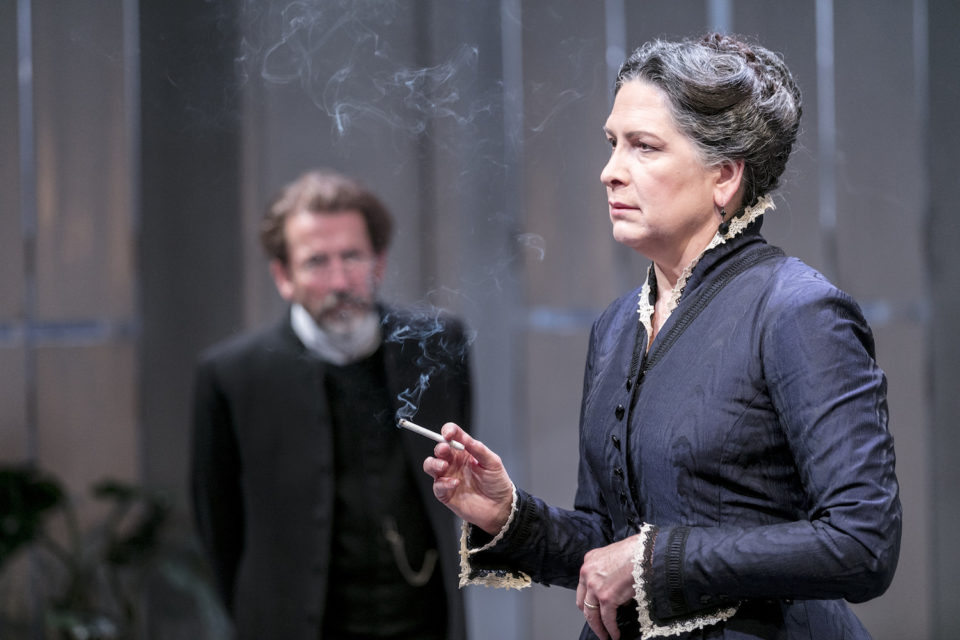“Must you breathe so loudly?” I ask my partner David as he reads beside me in bed.
“Perhaps you’d prefer it I didn’t breathe at all,” he replies, looking at me over the top of his glasses, one eyebrow raised.
I laugh then because he’s caught me. He knows that after twenty years together sometimes I do want to throttle him. But it will pass.
There’s a reason most fictional or cinematic romances end with a wedding or the death of the loved one. The everyday experience of marriage (or its equivalent, long-term cohabitation) often requires the dogged endurance and quiet persistence of the long distance runner. It takes great narrative and acting skill to turn this interior struggle into enthralling, even dangerous drama. And yet that’s exactly what Paul Thomas Anderson’s brilliant dark romance Phantom Thread achieves.
Daniel Day-Lewis (in what he maintains is his final acting role) plays Reynolds Woodcock, a fastidious fashion designer who dresses the rich and titled ladies of 1950s London. The handsome middle-aged couturier has ordered his small kingdom exactly how he wants it, from his lavender bow-tie down to his mushrooms cooked without too much butter. He calls himself a confirmed bachelor, yet he always has a female muse and model living with him in his spiral-staircase townhouse.
When he grows tired of this girl, he relies on his businesslike sister Cyril (a wonderfully crisp and tart Leslie Manville) to deal with the mess and dismiss her until the next subservient installment can be found. But when Reynolds meets Alma (Vicky Krieps), a clumsy young waitress at a seaside hotel, he’s met his match. Plain-faced (though radiant in certain light) and outspoken, the German-accented Alma proves to be the irresistible force to his immovable will.

Phantom Thread. 2017 Focus Features, LLC.
Phantom Thread is a sly and visually ravishing film. An acknowledged auteur, writer-director Paul Thomas Anderson (Boogie Nights, Magnolia, The Master, There Will be Blood) employs his signature mobile swooping camerawork, with breathtaking long tracking shots and intimate extreme close-ups that capture the bat of an eyelash or the tremble of a lip. With a velvety soft colour palette, the film luxuriates in the textures and shapes of the fashion world that forms the backdrop to the fraught but delicately funny domestic drama.
There are moments of powerful silence, but the intense orchestral score (by Radiohead’s Jonny Greenwood) adds urgency as the story delves deeper and deeper into the way a mismatched couple’s dynamic transforms with time and pressure. We observe the relationship as it cycles many times between the prettier and more elevated emotions and the uglier ones.
“I’ve been looking for you for a very long time,” Reynolds tells Alma on their first windswept walk. “He’s made all my dreams come true,” she tells a listener, as if narrating a Mills and Boon novel.
But very soon petty irritation, cruelty and even hatred set in. And then they find their rocky way back to rapturous love again. This cyclical pattern, so rarely explored by film, will feel familiar to anyone who’s weathered the seasons of a marriage.
It’s commonplace to observe that the opposite of love is not hatred, but indifference. Love and hatred exist on a spectrum, one that can be traversed at the speed it takes to watch one’s partner laugh too long at their own joke, or eat a messy breakfast.
Phantom Thread is a film full of tense and minutely observed dining scenes. Reynolds is a delicately strung genius. He demands hushed silence over breakfast so he can hunch over his sketchpad, sipping Lapsang tea and gathering his nerves for the day ahead. On her first morning in his house, Alma loudly scrapes butter onto her toast and clinks her teaspoon. He finds it as violent and disruptive as a demolition mob.
Much later, when she has won Woodcock into marriage and they’re on their honeymoon in the Alps, he flinches as he watches his new wife bite down on her spoon of cereal, his own teeth unconsciously mimicking the action. It’s clear that it’s requiring all his willpower to stay silent, and yet he does, because his love allows him (just) to muster tolerance for this creature he cannot live without, yet struggles to live with.

Phantom Thread. 2017 Focus Features, LLC.
The entire film is an acting master-class. Precisely delivered epigrammatic dialogue is interspersed with looks and gestures that speak a thousand words yet never say too much. It’s not just the magnificent Day-Lewis either, though he accomplishes more with a pulse of the vein in his temple than most actors do with their entire faces. As his counterpart, the little known Luxembourg actress Krieps meets and matches him. Though she blushes at their first meeting, she’s entirely convincing when she assures him she’ll win any staring competition.
In an interview about the film with the Guardian, Krieps noted: “Sometimes, if you look at older couples who have been together for years, they have the strangest ways of staying together – they play games, often sexual.”
Such game-playing is overt in films like The Duke of Burgundy (2014), Peter Strickland’s delightfully subversive lesbian S&M drama. But in Phantom Thread, a film without so much as a single sex scene (though many are implied), the games take on a different flavour. It would be giving away too much to describe the particular method Alma employs to maintain an equal power balance, but suffice to say, it’s strange, and yes, sadistic.
David Schnarch, the well-known relationship psychologist and author of the bestseller Passionate Marriage, describes marriage as a laboratory for human growth, forcing us to confront both the best and worst within ourselves. He has famously coined the term ‘Normal Marital Sadism’ to describe the shamefully pleasurable acts performed to deliberately hurt or upset one’s partner – emotional rather than physical violence that can include small punitive acts and the withholding of sex or affection.
According to Schnarch, the fact that this is commonplace does not mean it’s healthy or desirable. His views (which are unsurprising to anyone familiar with Freud, or indeed anyone who’s ever fought with a loved one) are in sharp contrast to the warm and fuzzy attachment theories espoused by many relationship and sex experts. ‘Normal Marital Sadism’ acknowledges the ugliness and pettiness that can coexist alongside real love. By recognising this, Schnarch argues, we are able to transcend it, and, I would argue, to make black comedy of it, as Phantom Thread adroitly does.
While no therapist would ever recommend the extreme methods by which Alma and Reynolds deal with irritation and maintain the balance of their love, in Phantom Thread Anderson seems to be saying something very truthful about the destruction and conflict that precede growth and creativity.
Before Reynolds meets Alma, he’s an aging spoilt brat, a dictator imprisoned by his own tastes. Marriage truly is the laboratory for his growth, and as he says to Alma when he proposes to her, “A house that never changes is a dead house.”
“Just one squirt, please,” I say to David every morning as he chooses aftershave from the collection of glass bottles on his shelf. As always, he insists on three squirts. He looks me square in the eye as he does it, and smiles.





